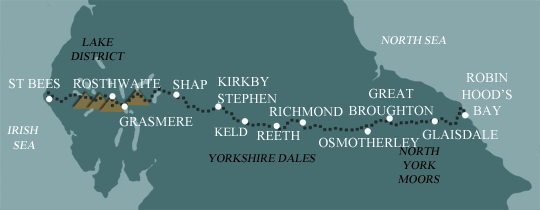Coast to Coast Path
St Bees to Robin Hoods Bay in 13 Days Walking Code: CC14
We offer 6 itineraries covering the whole route, walking across the heart of Northern England. This iconic route takes you through the stunning Lake District, across the rolling hills of the Yorkshire Dales, and over the windswept North York Moors. Whether you prefer a more leisurely journey or a faster pace, this unforgettable walk lets you explore some of the UK’s most beautiful and varied landscapes.
This 13 day itinerary splits the long Rosthwaite to Patterdale section at Grasmere, an attractive village at the very heart of the Lake District. Well worth a stop. However, average distances are high and the longest day is 23 miles, so you need to be fit. Our 15 and 16 day itineraries are the most popular options, but many people who are used to walking regularly in the mountains complete the route in 14 days.
| Miles | Km | ||
|---|---|---|---|
| Day 1 | Travel to St Bees for your first nights accommodation | ||
| Day 2 | St Bees to Ennerdale | 14 | 23 |
| Day 3 | Ennerdale to Rosthwaite | 15 | 24 |
| Day 4 | Rosthwaite to Grasmere | 9 | 14 |
| Day 5 | Grasmere to Patterdale | 9 | 14 |
| Day 6 | Patterdale to Shap | 16 | 26 |
| Day 7 | Shap to Kirkby Stephen | 21 | 34 |
| Day 8 | Kirkby Stephen to Keld | 13 | 21 |
| Day 9 | Keld to Reeth | 11 | 18 |
| Day 10 | Reeth to Richmond | 11 | 18 |
| Day 11 | Richmond to Ingleby Arncliffe | 23 | 37 |
| Day 12 | Ingleby Arncliffe to Clay Bank Top then transfer to Great Broughton | 12 | 19 |
| Day 13 | Transfer back to Clay Bank Top then walk to Egton Bridge | 21 | 34 |
| Day 14 | Egton Bridge to Robin Hood's Bay | 18 | 29 |
| Day 15 | Depart from Robin Hood's Bay after breakfast |
St Bees to Grasmere
The route starts on the shores of the Irish Sea in the village of St Bees. After climbing the impressive sandstone cliffs of the headland, the path turns inland and over agricultural land and foothills to Ennerdale Bridge and the start of the Lake District.The path continues up Ennerdale beneath Pillar Rock before climbing up to Brandreth, high in the fells with fantastic views of Great Gable and the Buttermere valley.
The route then drops into Borrowdale via Honister. With another day of climbing as the trail heads up the remote Greenup Gill and then down either the valley of Far Easedale or over the Lion and the Lamb, to Grasmere. This is a memorable day with views of Lakeland fells in all directions.
Grasmere to Kirkby Stephen
From Grasmere there is more climbing, either over the pass at Grisedale tarn or, for the more adventurous, via the summit of Helvellyn, England’s third highest mountain, before dropping down to Patterdale on the shore of Ullswater. The remotest walking of the tour leads from Ullswater over Kidsty Pike, with a tremendous viewpoint of the Lakeland fells then down to Haweswater and onwards to Shap.
Having left the Lakes, the route between Shap and Kirkby Stephen is undulating rather than mountainous, following limestone scarps and moorland paths. It passes the delightful village of Orton and travels onwards past numerous prehistoric sites to the market town of Kirkby Stephen.
Kirkby Stephen to Richmond
After Kirkby Stephen the route climbs up to Nine Standards, high above the Eden valley, then onwards into Swaledale, one of the longest and quietest areas of the Yorkshire Dales. The route crosses open moorland above the steep sided valley, punctuated by limestone drystone walls and field barns. Then between the upland sections the route drops into the valley to follow delightful stretches of riverside path, passing through the charming farming villages of Keld and Reeth.
Closer to Richmond, the moorlands give way to woodlands. Richmond is a bustling market town and is the largest settlement on the route, worthy of a day off to explore, with its cobbled market place overlooked by the castle originally built in the 11th century.
Richmond to Ingleby Arncliffe
This is the only point in its entire length of the Coast to Coast Path where you spend a considerable time at low altitude in relatively flat countryside. The route, which is often on country lanes, mainly passes through agricultural land as it crosses the Vale of Mowbray.
Ingleby Arncliffe to Blakey
Ingleby Arncliffe marks the start of the North York Moors. The route climbs through woodlands first, then follows the steep northern edge of the moors, affording panoramic views to the north. Gritstone outcrops and heather moorland are populated by grouse which provide added interest. After Great Broughton/Urra there is the last big climb of the route which leads to Urra Moor, around the head of pretty Farndale and begins the long descent to the coast.
Blakey to Robin Hood’s Bay
With the upland part of the route completed the route descends to the River Esk at Glaisdale, which it follows downstream to Egton Bridge and Grosmont, thought by many to be the prettiest villages on the route. Littlebeck, and its accompanying woodland, provide a final taste of picture postcard countryside before more agricultural land leads to the sea cliffs, which are followed south to Robin Hoods Bay, a fishing village famed for its narrow, steep streets, and characteristic roofscapes.
Challenging
This is a long trail with some remote and mountainous sections. It is, however, completed by thousands of ordinary people every year. A degree of walking fitness, the right equipment and common sense should get you there!
Terrain: Most of the route is on well defined, not overly challenging paths - but not all of it! The walk passes over some of the high fells of the Lake District and over open, often remote, moorland in the Dales and North York Moors.
What’s it like underfoot? Again, varied! Much of the route is on well defined paths, tracks, and country lanes, but there are sections that can be muddy, wet, rough, and steep (although not often all at the same time!)
How Much Up & Down? Quite a lot in the Lake District. Be prepared for a considerable amount of ascent and descent. In the middle section after Richmond there is a flat section for a day or two, depending on your itinerary , then more ascent and descent until the end, but far less than in the Lakes. The first half is the hardest.
Signposting: Some but by no means comprehensive. You will need to use your map and guidebook and be able to navigate with a compass
Weather & Navigation: Bad weather can be encountered, even in the summer months, so the ability to navigate is essential. You may be lucky enough to encounter warm, dry weather over the whole route and enjoy dry paths and tremendous views. Although you must always be prepared because the weather can change quickly
|
All Holidays
|
|
| Accommodation | Overnight Bed and Breakfast accommodation in selected hotels, farmhouses, village inns, guest houses and family B&Bs. Full English or Continental breakfast. |
| Guidebook | A detailed guidebook with route information, maps, photos and background information. |
| Information of Services Along the Route | A comprehensive Service Info sheet, including services such as cash points, banks, post offices, village shops, inns, cafes and taxis. |
| Maps | Two waterproof (1:40,000) Harvey Maps covering the whole route. |
| Personal Itinerary | A personal itinerary setting out each overnight stop, including large scale maps of each accommodation, to ensure you find it easily. |
| Emergency Telephone Support | If you get in to difficulties during your holiday, we are always available to help, even out of office hours. |
|
Options
|
|
| Luggage Transport | We will transfer your luggage between each overnight stop – if you leave your luggage at the accommodation when you set off in the morning, it will be moved on to your next B&B. You only need to carry a small day sack with the clothes and provisions you require during the day’s walk. |
| Packed Lunches |
Provided for each day’s walking and recommended on this holiday as there will not always be a handy shop or cafe on the route. |
| Off Road Parking | If you are travelling by car we can usually arrange off road parking for the duration of your trip. (There may be a small charge for this). |
| Arrangement of return transport | We can also arrange your transfer back to your car, (or advise you when public transport is a better option)! |
|
What’s not Included
|
|
| Evening Meals | Your evening meal isn’t included in the package, but we include full details and recommendations for each evening meal in your itinerary. You will normally be within walking distance of a pub and/or restaurant, or where there is good food available at the accommodation, we’ll book that for you. Allow about £30.00 per night. |
| Transport to the Start & Away from the Finish | Have a look at the ‘Travel Info’ tab above for suggestions. If you’re still struggling, get in touch and we’ll help you sort it out. |
| Travel Insurance | Even if you are based in the UK travel insurance is worth having. |
Good accommodation and friendly hosts are an essential part of any holiday. We understand this and go out of our way to find the best. We put a great deal of effort into hand picking our accommodation and matching it to individual customer requirements. As well as visiting the accommodation ourselves, we ask all our customers to complete a short evaluation on each night’s accommodation, which then gives us an insight into the day-to-day operation and lets us spot any potential issues before they become a problem.
We use a variety of accommodation. Over the course of your trip you might stay in a village inn, a bed and breakfast in a converted barn, a Victorian guest house, or on a working farm. In selecting the accommodation we look for helpful, friendly hosts with good quality, characterful accommodation close to the trail. Occasionally we may use a chain hotel.
We always try to arrange en suite accommodation, i.e. rooms with their own bathrooms for each night of your stay. However, in some of the more remote locations accommodation is limited and occasionally we may have to book rooms with shared bathrooms for one or two nights of your holiday, (especially if the booking is made at short notice), but we will always let you know if this is likely to be the case.
We are happy to book single rooms on our holidays but cannot normally book more than two for any one group. Single room bookings include a supplement.
Here are some examples of the accommodation we use on the Coast to Coast:
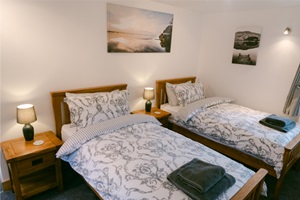 Julia and Adam welcome you to Crookabeck Bed & Breakfast, a beautifully converted farm building nestled beneath Place Fell in Patterdale. This charming accommodation is just a mile from Ullswater, making it an ideal base for enjoying rest day activities such as sailing and fishing, or a scenic journey on the Ullswater Steamer. Visit their website
Julia and Adam welcome you to Crookabeck Bed & Breakfast, a beautifully converted farm building nestled beneath Place Fell in Patterdale. This charming accommodation is just a mile from Ullswater, making it an ideal base for enjoying rest day activities such as sailing and fishing, or a scenic journey on the Ullswater Steamer. Visit their website
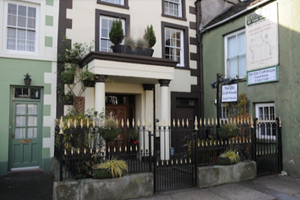 The Old Croft House is a bed and breakfast that is full of character. A wonderful old building located in the centre of Kirkby Stephen with individually designed, quirky bedrooms that are a treat to stay in. Nick and Rachel take very good care of their guests, welcoming them with homemade cakes and open fires. Visit their website
The Old Croft House is a bed and breakfast that is full of character. A wonderful old building located in the centre of Kirkby Stephen with individually designed, quirky bedrooms that are a treat to stay in. Nick and Rachel take very good care of their guests, welcoming them with homemade cakes and open fires. Visit their website
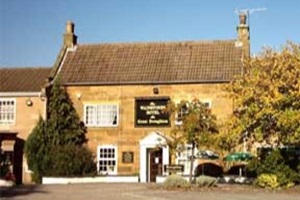 With the atmosphere of a Yorkshire Country Inn The Wainstones Hotel in Great Broughton is known for its attentive staff and excellent food. An 18th century building in a very picturesque location, this hotel is popular with walkers on the Coast to Coast path who can relax in the bar or treat themselves to a delicious meal in the restaurant. Visit their website
With the atmosphere of a Yorkshire Country Inn The Wainstones Hotel in Great Broughton is known for its attentive staff and excellent food. An 18th century building in a very picturesque location, this hotel is popular with walkers on the Coast to Coast path who can relax in the bar or treat themselves to a delicious meal in the restaurant. Visit their website
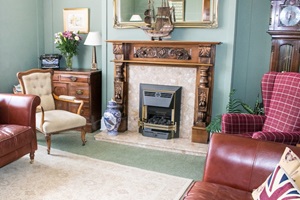 Beautifully restored and retaining many original features, Lee-Side Bed and Breakfast is a charming Victorian house built in 1897 by Captain Jacob Storm. Claire and Nigel offer a warm welcome to this picturesque setting in Robin Hood’s Bay which is just a short stroll through the cobbled streets to the sea. Visit their website
Beautifully restored and retaining many original features, Lee-Side Bed and Breakfast is a charming Victorian house built in 1897 by Captain Jacob Storm. Claire and Nigel offer a warm welcome to this picturesque setting in Robin Hood’s Bay which is just a short stroll through the cobbled streets to the sea. Visit their website
General travel information for the Coast to Coast route will be in your holiday pack including train and bus timetables where available.
Detailed instructions on getting to your first night’s accommodation by car, or on foot from the nearest train or bus station, will also be included in the holiday pack on individual accommodation maps.
To view train times please visit trainline where you can also purchase tickets in advance. For information on bus timetables please visit traveline
If you require secure car parking whilst walking this route, please contact us for detailed information – we arrange car parking in Kirkby Stephen with transfers to and from the start and end locations.
Getting There:
By Air:Your nearest international airports are Manchester (MAN) and Newcastle (NCL) you can then take a train to St Bees (approx 3.5 hours)
By Public Transport: There is a train station in St Bees Village (SBS). Most train journeys will pass through Carlisle (CAR) where you will need to change for St Bees. If travelling on a Sunday take the train to Whitehaven. It is then a short journey by taxi to St Bees (costing approx. £5).
By Road: St Bees is on the Cumbrian coast approximately an hour’s drive from junction 40 on the M6. From the M6 you follow the A66 then the A595.
Returning from Robin Hood’s Bay:
The nearest main railway station is in Scarborough – you can take the bus from Robin Hood’s Bay to Scarborough: Number 93 (hourly, 40 minutes travel time).
Grasmere
Grasmere is a charming village right in the heart of the Lake District National Park and a great location to spend a well earned rest day. It was once the home of the famous poet William Wordsworth and today you can visit two of his former homes - Dove Cottage and Rydal Mount. In the centre of Grasmere is St. Oswald’s Church, which contains the Wordsworth family graves. The village itself has narrow bustling streets with cafes, shops and pubs. The frequent local bus service connects Grasmere with Keswick and Ambleside if you want to explore further into the Lakes.
Patterdale
Patterdale offers spectacular scenery in a peaceful location. This tiny village in the heart of the English Lake District will give you a well earned rest before heading onwards on your walking route. Boat trips can be taken on the Ullswater Steamers to Pooley Bridge, with several opportunities to disembark and explore the lakeshore attractions along the way.
Kirkby Stephen
Kirkby Stephen is a traditional market town of historic buildings, cobbled yards, quaint corners and interesting shops. It is situated in a landscape of pastoral rural scenery with wild uplands. Being remote from large towns and population centres, Kirkby Stephen has developed a strong and self-sufficient identity and a vibrant sense of community.
Richmond
Richmond is an historic market town, dominated by its Norman Castle. The castle (which is open daily) sits on a hill above the town, with great views over the Dales. There are regular markets and quite a few places to enjoy a meal and a cup of coffee. There’s also a lovely riverside walk. It’s by far the biggest town on the Coast to Coast, and a very pleasant place to spend a day. If you’re only taking one rest day, make this it!
Robin Hood's Bay
This picturesque village is a hidden gem on the East Yorkshire coast consisting of a maze of tiny streets with individual shops, cafes and pubs. Robin Hood's Bay has a tradition of smuggling (during the late 18th century smuggling was rife on the Yorkshire coast) and there is reputed to be a network of subterranean passageways linking the houses. The rocks of Robin Hood’s Bay play host to a wealth of Jurassic history and fossilling is a wonderful activity for people of all ages along the huge, unspoilt beach. Likewise, the thrill of finding your first crab or starfish in a rock pool is equally as pleasurable.
| Prices | GBP (£) |
|---|---|
| Accommodation, map & guidebook only | £1479 |
| with Luggage Transport | £1648 |
| with Packed Lunches | £1628 |
| with Luggage & Lunches | £1787 |
Other Options |
|
| Extra Nights (per night) | £95 |
| Single Supplement (per night) | £63 |
| Solo Luggage Supplement (per day) | £0 |
